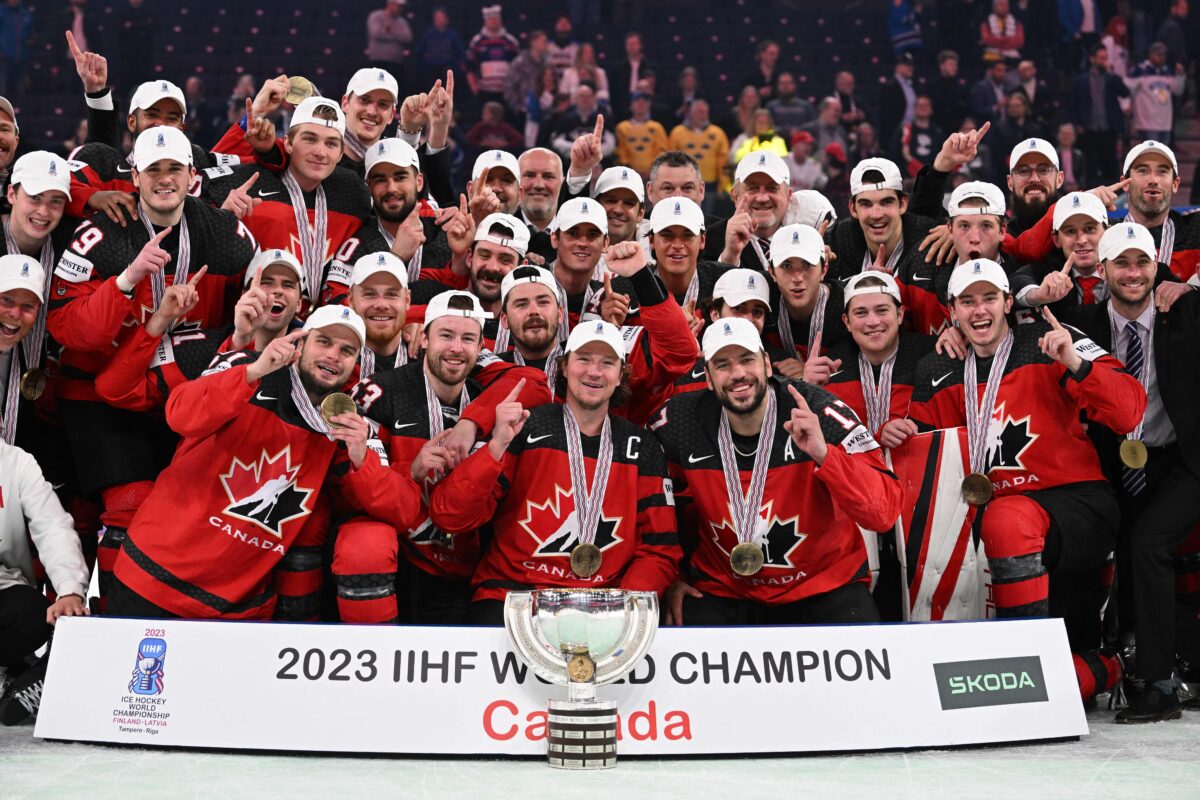Team Canada has won gold for the 28th time at the World Championships, defeating Germany 5-2. This was also Canada’s 53rd medal as they continue to be the most decorated nation in tournament history. Here is a look back at their path to gold.
Canada’s Path To The Gold Medal Game
While Team Canada won five of their seven preliminary-round games, it wasn’t in the same dominating fashion fans have come to expect over the years. Yes, they beat Latvia 6-0 but also suffered their second-ever loss to Norway, falling 3-2 in a shootout. Luckily, they were able to take advantage of a weaker group that featured no other team in the top five when it comes to world rankings, finishing second behind Switzerland with 15 points and a goal differential of plus-14.

During the preliminary stage, Canada also had to face some adversity as Detroit Red Wings’ Joe Veleno was suspended after their game against Switzerland for the remainder of the tournament. Midway through the second, he stomped/kicked Winnipeg Jets’ forward and Swiss captain Nino Niederreiter’s leg in a puck battle along the boards. While no injury occurred, it was a dangerous play that deserved a suspension.
Related: Team Canada 2023 World Championship Roster Breakdown
The suspension forced the Canadians to switch up their lines, as they would be without their first-line center for the remainder of the tournament. This left head coach André Tourigny in a difficult spot as he needed to tinker with his lineup late in the preliminary round to find some chemistry. In the end, he was able to find the right combinations, which helped minimize the hole left after the Veleno suspension.
The Canadians then took care of both host nations first in the quarterfinals defeating Finland 4-1, and then in the semi-finals, defeating Latvia once again, this time 4-2. What made these games exciting to watch is that there was a different hero who stepped up each night. Against Finland, St. Louis Blues forward Sammy Blais scored the game-winner midway through the second, while NHL draft prospect Adam Fantili’s highlight reel goal midway through the third against Latvia helped send them to the Gold Medal Game. They executed their gameplay to near perfection and, as a result, found themselves in the Championship Game for the fourth straight tournament, this time facing a German team that was looking for their first-ever gold at the World Championships.
Canada Wins Gold Once Again
While they had to fight back from one-goal deficits twice during the game, Canada defeated Germany 5-2 in the Championship Game, claiming their 28th gold medal at the tournament. The win also broke their tie with the Soviet Union/Russia for most gold medals at the tournament. With the victory, Canada has now won four of the last eight World Championships while collecting at least a medal at seven of those tournaments.
Related: Flames’ Weegar Deserves Bigger Role After World Championship
Just like they had against Finland and Latvia during the playoffs, Canada was able to execute their game plan well and got scoring throughout their lineup. Blais scored twice, including the game-winner for the Canadians, while Arizona Coyotes’ Lawson Crouse, Calgary Flames’ Tyler Toffoli and Philadelphia Flyers’ Scott Laughton found the back of the net. In net, Montreal Canadiens’ goaltender Samuel Montembeault was strong again, stopping 21 of the 23 shots he faced, finishing the tournament with a 6-1 record and a .939 save percentage. It was a hard-fought battle from start to finish, but in the end, Canada’s talent came through when they needed it most and helped them capture gold at this year’s World Championship.
Canada’s Balanced Scoring Makes The Difference
When looking back on this Canadian team, one thing that sticks out is how they were able to get balanced scoring throughout their lineup. In total, ten players scored a goal, while 19 skaters recorded at least a point during the tournament. Only one player eclipsed the double-digit mark for Canada, and surprisingly, it was Calgary Flames defender MacKenzie Weegar who finished the tournament with 11 points. He was also the only Canadian to receive an award as he was named the top defenceman and was voted to the Media All-Star Team.
Overall, the reason Canada won this tournament is that they played like a unit, not like a bunch of individuals. While the players themselves are talented and some of the best on their NHL teams, they adapted to the role they were given and put the team over individual success. They played hard from start to finish, and while not every performance was a masterpiece, they can now call themselves World Championship gold medalists.